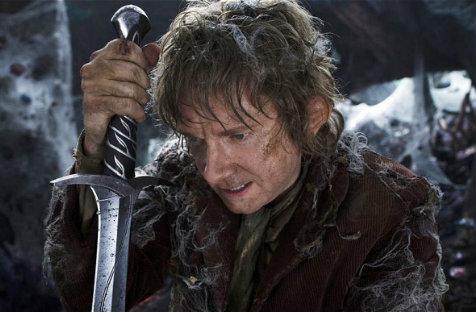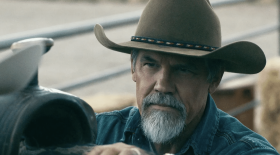Long before The Lord of the Rings (all 558+ minutes of it) was a dollar-shaped gleam in the eyes of New Line Cinema, JRR Tolkien’s The Hobbit was a runaway success.
Originally written for the author’s children, the book was almost unanimously praised by critics upon its publication in 1937. WH Auden named it ‘one of the best children’s stories of this century’ in The New York Times; it has sold more than 100 million copies worldwide, and been translated into some 50 languages in the 75 years since it first appeared on bookshelves.
Now, a decade after the critical and box office success of his three-part screen adaptation of Tolkien’s The Lord of the Rings, New Zealand filmmaker Peter Jackson has returned to Middle Earth to adapt The Hobbit – a 310 page book which has somehow grown into three separate, extended films, the first of them being The Hobbit: An Unexpected Journey.
As if not trusting in fans – and cinemagoers generally – to accept the film without a prologue which links it directly to the events and characters of The Lord of the Rings, the movie begins by reintroducing us to the elderly hobbit, Bilbo Baggins (Ian Holm) and his young cousin and heir, Frodo (Elijah Wood). Thereafter we flash back 60 years, meeting the young Bilbo, played by Martin Freeman (Sherlock), and the story proper gets underway – eventually.
The prologue also set up the film’s main plot through a lushly illustrated piece of exposition, telling the story of how the Dwarf King Thrór’s great love of gold attracted the dragon Smaug to his kingdom in Erebor, the Lonely Mountain, resulting in death and destruction, and scattering the dwarves across Middle Earth. Many years later, Thrór’s grandson, Thorin Oakenshield (Richard Armitage), reunites his kinsmen in a quest to reclaim their mountain home. They are aided in this mission by the wizard, Gandalf the Grey (Ian McKellen) who in turn recruits the world’s most unlikely burglar – Bilbo – to help the dwarves on their quest.
The Hobbit: An Unexpected Journey takes considerable time to set up and tell its story, and this is one of its major flaws. The film feels padded and overblown; the screenplay wallows in every detail of the book regardless of whether it add to the story or not, such as an extended sequence focused on Bilbo’s discomfort as the dwarves invade his home for an unexpected party. Such faithfulness to the source material may please fans, but detracts from what could otherwise be a well-paced and emotionally involving film – as does the decision by Jackson and his co-writers (Fran Walsh, Philippa Boyens and Guillermo del Toro) to draw upon the appendices of The Lord of Rings in order to strengthen links between the two sets of films. Bringing in characters such as the elf-queen Galadriel (Cate Blanchett) and the eccentric wizard Radagast the Brown (Sylvester McCoy), who have little or no role in the book, fleshes out the backstory, but their presence further bogs down the film’s already torturous pace, and feels like yet another unnecessary reminder of the previous trilogy – as do several deliberately echoed scenes from The Lord of the Rings: The Fellowship of the Ring that crop up throughout The Hobbit.
Nor is the film helped by some exceptionally clumsy foreshadowing and thinly drawn characters – the 13 dwarves in particular suffer in this regard, despite a range of cheesy costume and beard designs that are clearly meant to differentiate them. The dwarves’ boorish, even childish behaviour in the early stages of the film also grates.
Aesthetically, the film is pleasing – its cinematography and production design are strong, and Howard Shore’s score is dramatic without being overpowering. Performances too, are generally good; as the mild-mannered hobbit who becomes a hero, Freeman in particular impresses, while Barry Humphries makes a delightfully disgusting Goblin King. The film’s highlight, however, is the return of the vile yet pitiful Gollum (Andy Serkis) in a sequence that reveals how Bilbo first found the magic ring which was to become so significant in Tolkien’s later books.
Most Australian cinemas will show The Hobbit in 3D – however only 50 of the 300+ screens on which the film will be appearing will project it at the advanced frame rate of 48 frame per second (as opposed to the traditional 25 frames per second which films have been shown in previously). The result of the higher frame rate is unusual, though not entirely unpleasant, and definitely takes some getting used to. The initial effect is almost cartoonish; images are almost too bright and super sharp, as is the depth of field, though the effect is less noticeable over time, and certainly shows off the film’s numerous action sequences to good advantage. The higher frame rate also compensates for some of the more distracting elements of 3D films, which are usually notoriously murky. Ultimately, however, it feels more like a gimmick than a necessary evolution in motion picture-making – though only time will tell is this is actually the case.
As the first film in a trilogy, The Hobbit: An Unexpected Journey does not particularly impress. It features some genuinely engaging and exciting moments, but its sluggish pace frustrates and disappoints, while several continuity flaws (goblins attacking in broad daylight?!) will annoy both fans of the book and the keen-eyed viewer.
Peter Jackson’s first three films set in Middle Earth all had special editions which extended their running time – is it too much to hope that for The Hobbit, the special editions will cut these cinematic behemoths down to something leaner, more manageable, and altogether more engaging?
Rating: 3 stars out of 5
The Hobbit: An Unexpected Journey
Based on the book by JRR Tolkien
Directed by Peter Jackson
USA/New Zealand, 2012, 169 min
In cinemas 26 December
Distributor: Roadshow Films
Rated M
Actors:
Director:
Format:
Country:
Release:





